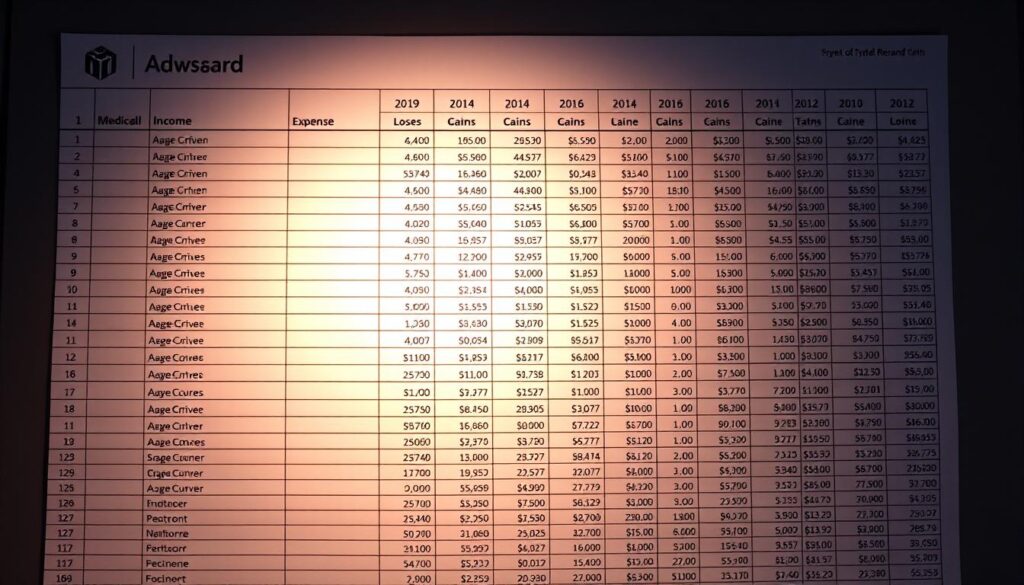Crypto yield farming is growing in popularity as DeFi expands. But, it’s important to know the cryptocurrency tax rules involved. You need to understand the rules to avoid penalties and make the most of your earnings.
The IRS views crypto transactions as property for tax purposes. This affects every step in yield farming, from putting assets in pools to getting rewards. It’s crucial to grasp the crypto tax implications of yield farming to meet U.S. tax reporting and calculate capital gains correctly.
Key Takeaways
- Yield farming activities generate taxable events requiring detailed records.
- IRS guidelines classify crypto rewards as taxable income or capital gains.
- Failure to report DeFi earnings can lead to audits and financial penalties.
- Automated tracking tools simplify compliance with cryptocurrency tax rules.
- Long-term holding periods may reduce capital gains tax burdens.
Understanding the Basics of Yield Farming
Yield farming lets users lock digital assets in DeFi protocols to earn rewards. By adding liquidity, they get interest, governance tokens, or fees. This creates taxable events tied to yield farming tax obligations, needing careful record-keeping from the start.
What Is Crypto Yield Farming?
Yield farming is about adding crypto assets to DeFi protocols to help them work. Users get tokens for lending, trading, or helping with governance. These rewards change based on demand and market conditions, but all gains must be reported for yield farming tax obligations.
Common Yield Farming Platforms
- Compound: Offers lending and borrowing with yield rewards in COMP tokens.
- Aave: Provides flexible borrowing terms and liquidity mining opportunities.
- Uniswap: A decentralized exchange where liquidity providers earn trading fees.
- Curve: Specializes in stablecoin pools with high-yield opportunities.
Typical Returns and Associated Risks
Yield farming can offer high returns, sometimes 10-100% annually. But, there are risks like impermanent loss and smart contract exploits. These risks make tracking gains and losses for tax reporting under yield farming tax obligations harder.
The Crypto Tax Implications of Yield Farming
Understanding the crypto tax implications of yield farming means knowing how the IRS classifies DeFi income. The cryptocurrency tax rules change based on how rewards are earned and used.
General Tax Classification of Yield Farming Income
The IRS sees most yield farming rewards as taxable income. This includes staking rewards, liquidity pool fees, and governance tokens. They are considered ordinary income, even if tokens stay in your wallet.
Ordinary Income vs. Capital Gains
- Ordinary income: Rewards like staking or liquidity pool fees are taxed as income. They follow income tax rates.
- Capital gains: Selling or trading tokens leads to capital gains. These are taxed based on how long you held them.
When Tax Liability Is Triggered
Tax obligations kick in at certain times:
- When you receive tokens from yield farming
- When you exchange rewards for other cryptocurrencies
- When you convert tokens to fiat currency
Not reporting these events can result in penalties from the IRS. Keeping track of all transactions is key to following cryptocurrency tax rules.
IRS Guidelines on Cryptocurrency Taxation
The IRS guidelines on crypto taxes set the rules for reporting crypto activities like yield farming. Since 2014, the IRS has seen crypto as property, not money, under Notice 2014-21. This means every action, from staking to swapping, is taxable.
- Property Rules Apply: Gains/losses are figured out using cost basis and holding periods.
- Reporting Requirements: Form 1040 now has a checkbox for crypto transactions since 2020.
- Expanded Compliance: The 2021 Infrastructure Act makes exchanges report transactions over $10K.

Yield farming’s complexity makes it hard for taxpayers to follow the rules. The IRS still hasn’t given clear guidance on DeFi platforms. For example, getting governance tokens during staking is taxable income, even if you didn’t “sell” anything.
Every transaction, including fees and rewards, must be tracked to follow IRS guidelines on crypto taxes. Not following these rules can lead to penalties, audits, or demands for back taxes.
Recent changes, like the Form 1040 checkbox, show the IRS is cracking down. Cryptocurrency’s ups and downs, along with the many platforms, make it hard to report accurately. Taxpayers should use tools or experts to understand the IRS guidelines on crypto taxes and avoid mistakes.
Taxable Events in Yield Farming Activities
Every step in yield farming can lead to tax obligations. It’s important to know when these taxable events in yield farming happen to avoid penalties. The IRS watches for specific actions that create taxable income or gains.
- Depositing Assets: Putting crypto on platforms like Uniswap or Curve might be taxable. If the IRS sees it as transferring ownership, gains since purchase could be reported.
- Receiving Governance Tokens: Tokens like SUSHI or AAVE given for participating in protocols are taxed as ordinary income. Their value at receipt determines taxable income.
- Claiming Rewards: Getting yield rewards triggers immediate tax liability. The fair market value at the time of claiming must be reported as income.
- Withdrawing Assets: Taking out deposited crypto can lead to capital gains taxes. Compare original cost basis to current value to calculate taxable profit or loss.
Every action, from depositing to withdrawing, leaves a trail. Missing even one taxable event in yield farming risks audits. Keep track of every transaction date, value, and platform to stay compliant.
Tax Treatment of Staking Rewards in DeFi
The tax treatment of staking rewards is a big deal for DeFi users. The IRS sees staking rewards as regular income, just like mining income. This means you have to pay taxes on them when you get them, even if you hold them for a long time.
There’s still a debate about when rewards should be taxed. The Jarrett v. United States case is trying to change how we report gains. The way you stake also affects your taxes. For example, validators have different rules than users who stake through platforms like centralized exchanges or protocols.
- Direct staking as a validator may require immediate tax reporting.
- Platform-based staking often triggers taxable events automatically.
- Liquid staking assets (e.g., stETH from Lido) complicate basis tracking due to token swaps.
Things get even more complicated with wrapped tokens. Staking rewards can create new assets. You need to keep track of all your transactions to meet IRS Form 1040 requirements. It’s wise to get help from crypto tax experts to stay out of trouble in this changing world.
Record-Keeping Requirements for Yield Farmers
Keeping accurate records is key for crypto tax compliance. Yield farmers need to document every transaction to report income correctly. This helps avoid audit risks and meets IRS standards.

Essential Documentation Needed
Here’s what you should track for yield farming:
- Transaction hashes and timestamps
- Token amounts and USD values at time of trade
- Gas fees paid for network transactions
- Platform withdrawal and deposit logs
Tracking Cost Basis Across Platforms
Tracking cost basis is important to avoid overpaying taxes. Here are ways to do it:
- FIFO (First-In-First-Out): Uses oldest purchase prices for sales calculations.
- LIFO (Last-In-First-Out): Prioritizes recent transaction values.
- Specific Identification: Manually selects exact tokens sold to optimize tax outcomes.
Software Solutions for Crypto Tax Tracking
Use tools like CoinTracker, Koinly, and ZenLedger to automate tracking. These platforms:
- Aggregate data from multiple DeFi platforms
- Calculate cost basis using chosen methodologies
- Generate IRS-ready Form 8949 reports
Keeping records up to date ensures you’re in compliance. It also makes tax reporting easier. These tools help organize DeFi transactions, making audits simpler.
Reporting DeFi Income on Your Tax Return
When it comes to tax reporting for DeFi income, you need to use the right IRS forms. Start with Schedule 1 to report governance tokens as “Other Income.” Capital gains from selling tokens go on Schedule D and Form 8949. This form details the buy/sell dates and prices.
- List all DeFi transactions on Form 8949, separating short-term and long-term gains.
- Include gas fees as part of cost basis or deduction on sales.
High-volume traders might face self-employment taxes. Report profits on Schedule C if farming is a business. For example, selling tokens held under a year triggers short-term capital gains rates.
Starting in 2027, decentralized exchanges must report user data. So, keep detailed records now. Use tools like CoinLedger’s DeFi tax guide to ensure accuracy. Missing income or incorrect form use risks penalties. Always review IRS guidelines annually as crypto regulations evolve.
Tax Consequences of Different DeFi Platforms
Every DeFi platform has its own tax rules. It’s important to understand the tax consequences of DeFi platforms. This means looking at how platforms like Compound, Uniswap, and Aave affect taxes.
Taxes depend on how each platform rewards users, charges fees, and handles assets.
Compound Finance Tax Implications
Interest from Compound is seen as taxable income. Users must report gains and COMP tokens as income. Borrowers might deduct loan interest, but check with a tax advisor first.
Key points:
- Interest income taxed at ordinary income rates
- COMP tokens taxed when received
- Borrowing interest deductions require documentation
Uniswap Liquidity Provision Taxation
Uniswap’s liquidity provision leads to taxable events. LP tokens and trading fees are taxed. Impermanent loss doesn’t offset gains.
Users need to track:
- LP token receipt as income event
- Fee earnings reported annually
- Redemption events requiring cost basis calculations
Aave and Other Lending Platforms
Aave’s interest on deposits is taxed as income. aTokens, which represent interest, are taxable when received. Flash loans have unclear tax rules, possibly requiring reporting.
Key considerations:
- Lending interest taxed at capital gains rates if held long-term
- Flash loans require tracking of fee payments
- aTokens treated as separate taxable assets
Capital Gains Calculations for Yield Farming
Figuring out capital gains on yield farming means keeping track of when you bought and sold assets. The IRS splits gains into short-term (less than 1 year) and long-term (more than 1 year). This affects how much tax you pay. Short-term gains are taxed like regular income, while long-term gains get lower rates of 0%, 15%, or 20%.
Short-Term vs. Long-Term Treatment
- Short-term: Taxed at individual income rates (up to 37%) if held less than 12 months
- Long-term: Qualifies for capital gains rates based on income level and holding period
Cost Basis Challenges
There are tricky situations to deal with:
- Liquidity pool entries trigger basis calculations for multiple tokens
- Token swaps within protocols reset holding periods
- Governance tokens received as rewards create dual taxation points
For example, selling yield rewards first gets taxed as income. But, you need to recalculate capital gains when you sell them later. Losses from liquidity pools might be deductible if you document them well. Use crypto tax software to keep track of changes in basis on platforms like Uniswap or Aave.
Common Crypto Tax Compliance Mistakes to Avoid
Ignoring crypto tax rules can cost you a lot. Many yield farmers make simple mistakes that catch the IRS’s eye. Here are some common errors to steer clear of:
- Assuming crypto-to-crypto swaps aren’t taxable: Every trade, even between tokens, triggers capital gains or losses. The IRS treats these as taxable events.
- Ignoring small transactions: All crypto activity—even $1 trades—must be reported. Overlooking micro-transactions risks audit flags.
- Missing governance token income reporting: Receiving UNI, COMP, or other tokens counts as taxable income when received, even if value later drops.
- Cost basis miscalculations: Forgetting gas fees or mixing FIFO/LIFO methods creates discrepancies. Track every transaction detail.
- DeFi’s “anonymity” myth: Blockchain analytics tools let the IRS trace DeFi activity. Uniswap and Aave interactions are auditable.
Yield farmers need to report income correctly. Misclassifying gains as passive income instead of business income can lead to underpayment penalties. Use tools like CoinTracker or Koinly to stay on track. The IRS is cracking down on crypto audits—avoiding these mistakes ensures smoother tax filings.
State Tax Considerations for Yield Farmers
Yield farming taxes vary by state, offering both chances and hurdles for crypto investors. In places like California, New York, and New Jersey, taxes are high and rules strict. On the other hand, states like Wyoming, Texas, and Florida have lower taxes. Digital nomads need to understand residency laws to avoid surprises.
High-Tax vs. Tax-Friendly Regions
States fall into two categories when it comes to crypto taxes:
- High-tax states: California, New York, and New Jersey tax crypto gains, with rates over 10% for the wealthy.
- Tax-friendly states: Wyoming, Texas, and Nevada don’t tax income, making them good for yield farmers. Florida doesn’t tax income but requires detailed reports.
State-Specific Rules to Follow
Some states have their own rules:
- Ohio lets you pay state taxes with Bitcoin or Ethereum, making it easier for some.
- Wyoming’s 2021 laws made it easier for residents to follow crypto laws.
- California requires separate reporting of crypto on state tax forms, unlike federal forms.
It’s crucial to check state rules every year since they change fast. Moving to a state with lower taxes can help reduce your tax burden while staying within the law.
International Tax Implications for U.S. Citizens

U.S. citizens and residents worldwide must report all crypto yield farming income. This is under cryptocurrency tax rules, even if earned through foreign platforms. The IRS sees international crypto gains as taxable income, needing to be reported on Form 1040.
Holding crypto on overseas exchanges or using DeFi protocols doesn’t get you out of U.S. reporting. You still have to follow the rules.
- Foreign Bank Account Report (FBAR) filings are required if crypto assets held abroad exceed $10,000 annually.
- Form 8938 applies to specified foreign financial assets, including crypto stored on non-U.S. platforms.
Citizens earning crypto income in countries with their own cryptocurrency tax rules might face double taxation. You can use Foreign Tax Credits (Form 1116) to reduce U.S. taxes. But, the Foreign Earned Income Exclusion doesn’t cover crypto gains. It only helps with wages and self-employment income.
Expatriates thinking about giving up citizenship must reveal all crypto holdings. The Exit Tax requires reporting any unrealized gains in digital assets at the time of departure. It’s wise to get help from experts to deal with these complex rules and avoid fines.
Working with Tax Professionals Experienced in Cryptocurrency
Understanding IRS rules on crypto taxes is complex. Yield farming, with its DeFi protocols and changing IRS rules, often needs expert help. For a basic overview, check out this guide. Experts help when IRS rules are unclear.
When to Hire a Crypto Tax Specialist
Get a specialist if you:
- Trade often or use many DeFi platforms
- Get big rewards from yield farming
- Have international crypto or past tax issues
- Face audits or need IRS crypto tax rule clarity
Questions to Ask Before Hiring
Ask potential hires:
- How many crypto clients have they helped with DeFi?
- Do they keep up with IRS crypto tax rules?
- What tax software do they use (e.g., CoinTracker, Koinly)?
- How do they handle unclear IRS rulings?
Choose between CPAs, Enrolled Agents, or tax attorneys based on your needs. Experts in IRS crypto tax rules can avoid costly mistakes. They ensure you follow changing rules.
Staying Ahead of Evolving Crypto Tax Regulations
Crypto tax rules are always changing, especially for yield farming. The 2023 Infrastructure Act made exchanges report more. But, new rules for yield farming rewards and liquidity pools might come soon. Farmers need to keep up with IRS updates and court decisions to follow the law.
Stay updated by checking IRS.gov, Treasury Department alerts, and legal cases like Coinbase’s reporting issue. Signing up for newsletters from the Tax Foundation or crypto tax services like Koinly helps. They inform you about changes in yield farming tax rules and state reporting needs.
Use tools like CryptoTaxCalculator or ZenLedger to track all transactions. Talk to tax experts who know DeFi platforms like Uniswap or Aave. They can help with unclear tax rules or state-specific laws. Regularly check your strategy to stay current with new laws.
Being flexible and keeping good records is key as rules get stricter. By actively following taxable events and IRS news, yield farmers can avoid tax problems. This way, they can stay on top of the complex tax world without missing important deadlines.
FAQ
What are the crypto tax implications of yield farming?
Yield farming can lead to several taxable events. This includes getting tokens as income and capital gains from selling tokens. The IRS views these activities under general cryptocurrency tax rules. So, yield farmers must report their earnings correctly.
How does the IRS view yield farming income?
The IRS sees yield farming rewards as ordinary income. This income is taxed based on your income tax rate. But, if you sell tokens for a profit, those gains might be taxed as capital gains.
When is tax liability triggered in yield farming?
Tax liability can happen in several ways. It can occur when you receive tokens, claim rewards, or convert them to fiat or other cryptocurrencies. Each of these actions is considered a taxable event by the IRS.
What records should I keep for yield farming activities?
Keeping detailed records is crucial. You should note transaction dates, amounts, and values. This helps track your cost basis and ensures you follow crypto tax rules.
Are there specific tax rules for staking rewards?
Staking rewards are generally taxed like yield farming rewards. They are taxed as ordinary income when received. The specifics can depend on whether you stake directly or through a platform.
What are the common mistakes to avoid with crypto taxes?
Avoiding common mistakes is key. These include not reporting all transactions and misunderstanding tax rules for crypto exchanges. Also, don’t overlook the tax implications of governance tokens or rewards.
How do state taxes affect yield farming?
State taxes can vary a lot. High-tax states might add extra costs for yield farmers. But, some states are more crypto-friendly, offering better tax treatments. Knowing your state’s tax rules is important for compliance.
What resources are available for understanding IRS guidelines on crypto taxes?
The IRS offers guidance through Notices 2014-21 and its virtual currency FAQs. These resources provide general advice. Also, talking to tax pros experienced in crypto can help you understand these rules better.
Can I claim losses from yield farming on my taxes?
Yes, you can claim yield farming losses to offset tax liabilities. But, it’s important to document these losses well. This is to support your claims in case of an audit.
When should I consider hiring a crypto tax specialist?
If you have complex tax obligations, high trading volumes, or significant yield farming income, consider a specialist. They can help with your unique situation, especially if you’ve had compliance issues before.


No comments yet